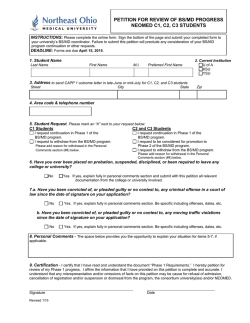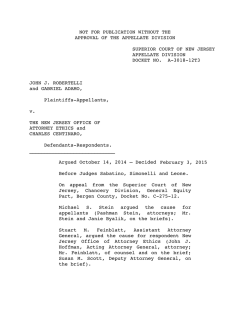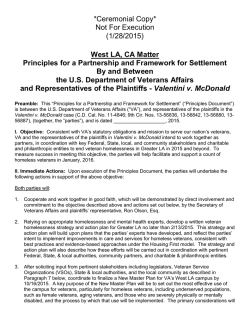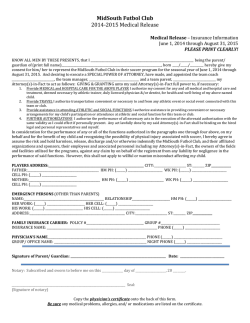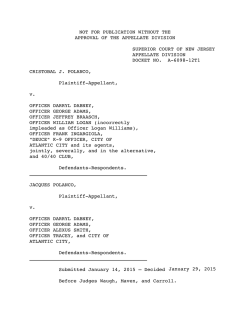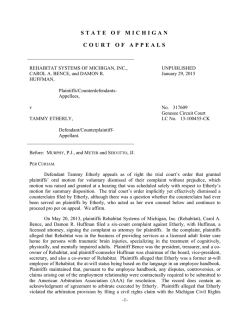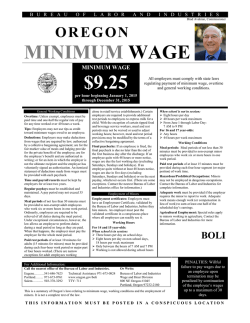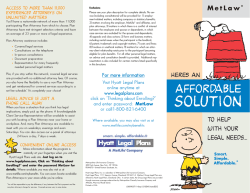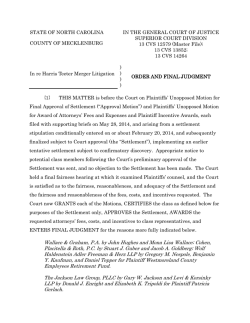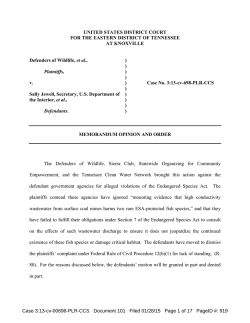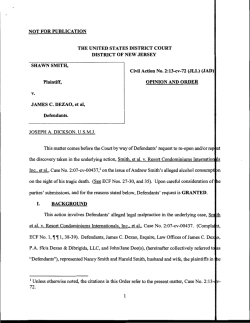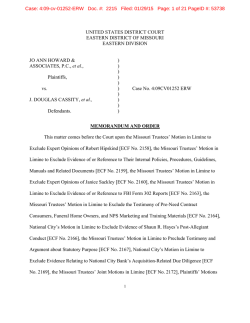
Department 3 - Superior Court of California
Tentative Rulings February 2, 2015 Department 3 8:30 a.m. NOTE: This Court does not follow the procedures described in Rules of Court, Rule 3.1308(a). Tentative rulings appear on the calendar outside the court department on the date of the hearing, pursuant to California Rule of Court, Rule 3.1308(b)(1). As a courtesy to counsel, the court also posts tentative rulings no less than 12 hours in advance of the time set for hearing. The rulings are posted on the court’s website (www.shastacourts.com) and are available by clicking on the “Tentative Rulings” link. A party is not required to give notice to the Court or other parties of intent to appear to present argument. In addition, the Court also posts proposed Case Management Orders, which may be accessed by going to the shortcut for “Case Management” on the court’s website at www.shastacourts.com. BEGUIN VS. SFORZINI Case Number: 14CV672 Proposed Tentative Ruling on Order to Show Cause re Sanctions: The Court has received a default judgment prove up package from the Plaintiff. This matter is continued to Monday, February 23, 2015 at 8:30 a.m. in Department 3. If the default judgment is executed, the February 23, 2015 hearing will be vacated. No appearance is necessary on today’s calendar. CLARK, ET AL VS. TRAFFIC SOLUTIONS, ET AL Case Number: 170596 Tentative Ruling on Plaintiffs’ Motion for Attorney Fees: The Court notes that this motion is unopposed. An opposition was lodged by non- party Twin City Fire Insurance Company which requested the right to intervene. The request to intervene was not brought by ex parte application or notice motion and therefore their request was denied by a minute order dated January 28, 2015 and their opposition was returned unfiled. The opposition was not considered in preparing this memorandum. Plaintiffs request an award of attorney’s fees as the prevailing party in the amount of $180,981.35 pursuant to Labor Code section 218.5(a). Labor Code section 218.5(a) provides in pertinent part, “In any action brought for the nonpayment of wages, fringe benefits, or health and welfare or pension fund contributions, the court shall award reasonable attorney’s fees and costs to the prevailing party if any party to the action requests attorney’s fees and costs upon the initiation of the action.” Plaintiffs argue that they brought an action for the nonpayment of wages and are therefore entitled to “reasonable attorney’s fees”. Plaintiffs were successful at trial on a single cause of action for retaliation (the Seventh Cause of Action in the Second Amended Complaint). The Court’s minute order dated October 3, 2014 indicates that the Court found that “As to Cause of Action #7, Plaintiff’s have produced sufficient evidence to prove the defendants illegally retaliated against the Plaintiffs (Labor Code Section 98.6) for making complaints about the proper payment of wages, including but not limited to the calculation of wage rates, meal periods, rest periods, and travel pay.” The minute order continues by providing each Plaintiff with compensatory damages plus a statutory penalty of $10,000. The Seventh Cause of Action in the Second Amended Complaint is labeled “Retaliation” and provides factual allegations related to Defendants retaliating against Plaintiffs for complaining that wages were improperly computed. The Seventh Cause of Action (paragraphs 45 & 46) reflects that the crux of this cause of action is that Defendants retaliated against the Plaintiffs. Paragraph 47 indicates that Plaintiffs have been 1 damaged “as a result of said retaliation, in the form of lost wages and lost employment hours, and lost fringe benefits.” The Seventh Cause of Action does not expressly reference Labor Code section 98.6. Plaintiffs have not cited any case authority where attorney’s fees have been awarded pursuant to Labor Code section 218.5 for a retaliation cause of action; rather, their argument is based on a strict reading of Labor Code section 218.5 which provides for reasonable attorney’s fees in “an action brought for the nonpayment of wages.” Plaintiffs argue that the retaliation action was for the “nonpayment of wages”. A review of the Seventh Cause of Action clearly shows that the cause of action was based on retaliation and Plaintiffs were “damaged as a result of said retaliation, in the form of lost wages and lost employment hours, and lost fringe benefits, according to proof.” Plaintiff’s Second Amended Complaint ¶ 47. Whether Plaintiffs are entitled to attorney’s fees is based on whether their Seventh Cause of Action was for “nonpayment of wages” or for retaliation. In Kirby v. Immoos Fire Protection, Inc. the Supreme Court of California held that Labor Code section 218.5 does not authorize the award of attorney’s fees for a successful claim brought under Labor Code section 226.7 for failure to provide meal and rest breaks (2012) 53 Cal. 4th 1244. Labor Code section 226.7(a) provides that “No employer shall require any employee to work during any meal or rest period mandated by an applicable order of the Industrial Welfare Commission.” It continues in subdivision to provide that legal remedy for a violation of subdivision (a) is an “additional hour of pay.” The employer’s failure to provide the additional hour of pay does not form part of a Labor Code section 226.7 violation. Id. at 1256-57. The failure to provide the meal or rest break is what triggers a violation of Labor Code section 226.7. Accordingly a Labor Code section 226.7 claim is not brought for the nonpayment of wages; it is an action for non-provision of the meal or rest breaks. Id. at 1257. The language “action brought for” in Labor Code section 218.5 is the alleged violation, not the desired remedy. Id at 1258. The Plaintiffs find themselves in the same situation as the prevailing party in Kirby. Labor Code section 98.6(a) provides in pertinent part, “A person shall not discharge an employee or in any manner discriminate, retaliate, or take any adverse action against any employee or applicant for employment because the employee or applicant engaged in any conduct delineated in this chapter, including the conduct described in subdivision (k) of Section 96, and Chapter 5 (commencing with Section 1101) of Part 3 of Division 2 . . .” Labor Code section 98.6(b)(1) then provides that the remedy for the discriminated against employee is reinstatement and reimbursement for lost wages and work benefits caused by those acts of the employer. This language mirrors that of Labor Code section 226.7 with the exception of the culpable acts. Here like in Kirby the alleged violation is not the nonpayment of wages but rather independent culpable acts. The award of compensatory damages provided by the Court after trial was the remedy based on retaliatory conduct just like the award in Kirby was for compensatory damages in the form of one additional hour of pay based on a failure to provide meal and rest breaks. For these reasons, the Seventh Cause of Action is not an action “brought for nonpayment of wages”; rather it is an action brought for retaliation. As such the attorney’s fees provision of Labor Code section 218.5 is inapplicable and Plaintiffs are not entitled to recover attorney’s fees. The motion is DENIED. Plaintiffs are instructed to prepare the order. DANIEL V. SHASTA ORTHOPAEDICS Case Number: 178310 Tentative Ruling on Demurrer to the First Amended Cross-Complaint: This matter was continued by stipulation of the parties to Monday, February 17, 2015 at 8:30 a.m. in Department 3. No appearance is necessary on today’s calendar. 2 FILLMORE VS. PROVENCIO, ET AL Case Number: 179742 Tentative Ruling on Motion to Compel Responses to First Set of Form Interrogatories and Requests for Production and to Have Matters Deemed Admitted in the First Set of Request for Admissions: The Court notes that the motion is unopposed. Defendants’ motion is GRANTED. Plaintiff shall provide responses, without objections, to Defendant’s Form Interrogatories, Set One and Request for Production of Documents, Set One, within 30 days of service of notice of entry of order. Each of the requests in the Request for Admissions, Set One is deemed admitted by the Plaintiff. An order has been provided to the Court and will be executed after the hearing. IN RE BIRMINGHAM Case Number: 181406 Tentative Ruling on Petition for Transfer of Structured Settlement: California Insurance Code section 10137 sets forth the conditions of granting a petition for transfers of structured settlement payment rights, and provides that a transfer of structured settlement payment rights must be “fair and reasonable and in the best interest of the payee, taking into account the welfare and support of his or her dependents.” Mr. Birmingham is an unemployed unmarried 18 year old man that claims a financial hardship without providing any specific details related to said hardship. Mr. Birmingham also states that the lump sum he would receive pursuant to this transfer would be used to purchase a home; however approving the transfer will leave Mr. Birmingham with a monthly income of only $400.00, an amount insufficient to pay the mortgage associated with the home purchase. Granting the transfer as requested would create a substantial financial hardship for Mr. Birmingham and therefore the transfer is not in his “best interests”. The Petition is DENIED without prejudice. IN RE HANSEN Case Number: 181410 Tentative Ruling on Petition for Transfer of Structured Settlement: California Insurance Code section 10137 sets forth the conditions of granting a petition for transfers of structured settlement payment rights, and provides that a transfer of structured settlement payment rights must be “fair and reasonable and in the best interest of the payee, taking into account the welfare and support of his or her dependents.” Ms. Hansen is a disable divorced 40 year old woman with one minor dependent with special needs. Ms. Hansen is not claiming a financial hardship nor does she state that the money requested is for necessities. The transfer proposed by Petitioner would result in Ms. Hansen giving up $41,400 in future payments for a present payment of $7,000. The equivalent interest rate for this transaction is 16.04% and the quotient (net payment divided by discounted present value) is 22.77%. The interest rate is high for this type of transaction and the quotient is one of the lowest seen by this Court. The terms of this transfer are not favorable to Ms. Hansen. The Petition does not establish that given the terms of this transaction that the transfer would be in Ms. Hansen’s best interest. There is no claimed financial hardship nor is the money needed for necessities which precludes the Court from finding that the transfer with an equivalent interest rate of 16.04% is in her best interest. The Petition is DENIED without prejudice. A proposed order was provided which will be modified after the hearing to reflect the Court’s final ruling. 3 IN RE LANKFORD Case Number: 180555 Tentative Ruling on Petition for Change of Name: The Court requires proof of service on the minor’s father before the petition may be granted. IN RE SNYDER Case Number: 181167 Tentative Ruling on Petition for Change of Name: The Court requires proof of publication before the Petition can be granted. JOHNSON VS. CHENEGA Case Number: 179416 Tentative Ruling on Motion to Compel Further Response to Demand for Production of Documents: Plaintiffs seek to compel further responses related to the personnel/employment records of nine former employees of defendant, Chenega Security & Protection Services, LLC (CSPS). Plaintiffs allege that the personnel records are relevant to show a discriminatory atmosphere or corporate mindset against persons in a protected category or who engaged in a protected activity like the plaintiffs. Both sides acknowledge the profound privacy rights an employee has in his or her employment records. Disclosure can only occur upon a substantial showing of need which outweighs those privacy interests. Even if the Court were to allow the disclosure, it would only do so by means determined to be the least intrusive into the third parties’ privacy rights. This might include, for example, allowing a limited or redacted disclosure and/or an in camera review of the disputed records (following the suggestion expressed by the Third District Court of Appeal in El Dorado Savings & Loan Association et al. v. The Superior Court of Sacramento County (1987) 190 Cal.App.3d 342). At the previous hearing on January 20, 2015, the Court continued this matter to today’s date and ordered Defendants to provide a Privilege Log of the disputed documents. The Privilege Log has been received and reviewed by the Court. The Privilege Log appears to contain the reasons for discipline and termination that are at the heart of Plaintiffs’ claim of right to these documents; however, there may be additional information in the documents themselves that reflect the discipline or termination was a pretext for retaliatory motives. The Court orders Defendants to produce the documents identified in the Privilege Log to the Court for an in camera review no later than Friday, February 13, 2015. The documents are to be provided to the Court only and in a sealed envelope marked confidential. The documents will be maintained sealed in the confidential side of the Court’s file. The Court will then review the documents in camera to see if they contain any additional information that would require disclosure. After the Court’s review an order will be entered as to the whether the documents will be produced and if they are to be produced how the information is to be protected i.e. redaction, protective order etc. This matter is continued to Monday, February 23, 2015 at 8:30 a.m. in Department 3. The Court will make its final order on this matter at that time and return the documents to counsel for the Defendant. No appearance is necessary on today’s calendar. 4 ****************************************************************************************** February 3, 2015 8:30 a.m. ****************************************************************************************** WOODROME V. PONZIO Case Number: 175443 Tentative Ruling on Emergency Ex Parte Application to Continue Trial: The Court has received from Plaintiff’s counsel an “Emergency Ex Parte Application to Continue Trial” seeking to place on the Court’s February 3, 2015 calendar a Motion to Continue Trial. It should be noted that trial is scheduled to commence on February 10, 2015. The application includes a stipulation from all counsel that the matter may be heard on the date requested, subject to the Defendant being allowed to file an opposition at the hearing and Plaintiff waiving a reply. This request is highly unusual and clearly seeks to sidestep the appropriate procedure of scheduling an ex parte application for an order shortening time. Normally, the Court would not allow this application to be filed much less make any rulings pertaining to it. However, given the exigency and the stipulation of the parties, the Court exercises its incidental powers pursuant to CCP Section 128, and based upon the interests of efficiency and as a courtesy to counsel, the Court will allow the matter to be heard. This should not be considered precedent for this procedure being allowed in the future. Given the nature of the motion and stipulation, no tentative is issued. Counsel should be prepared to argue the matter and the Court will endeavor to rule from the bench. 5
© Copyright 2026
